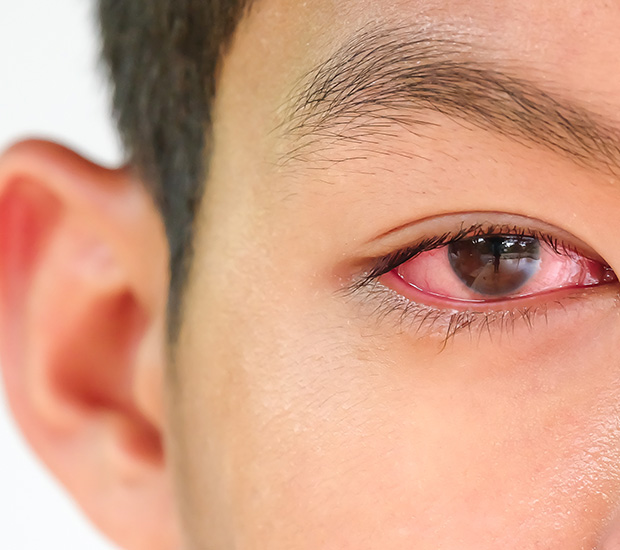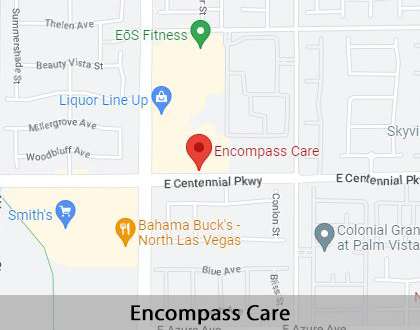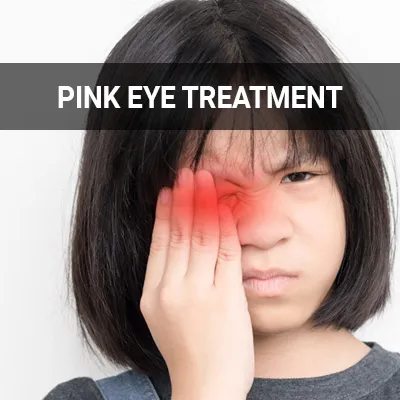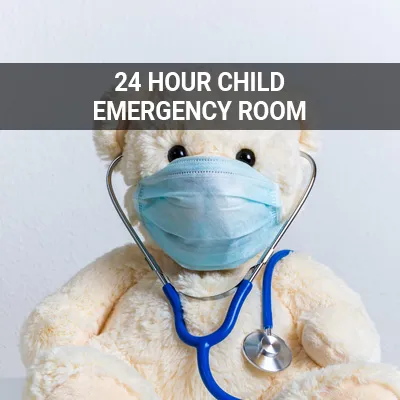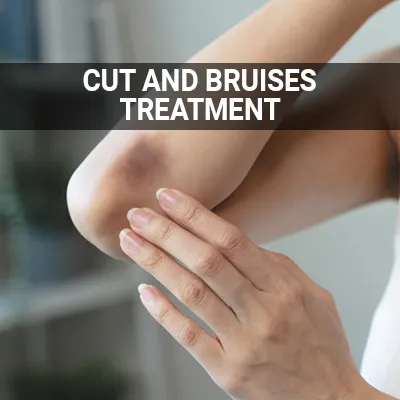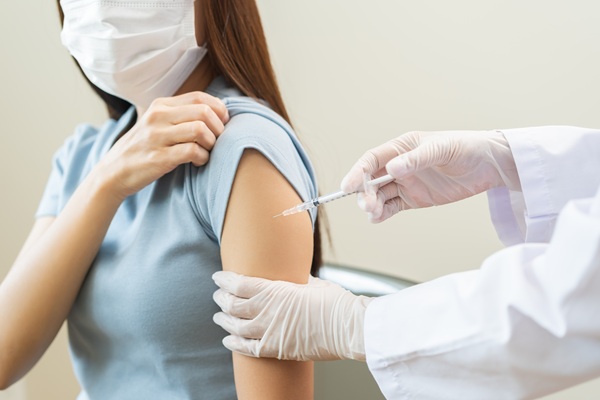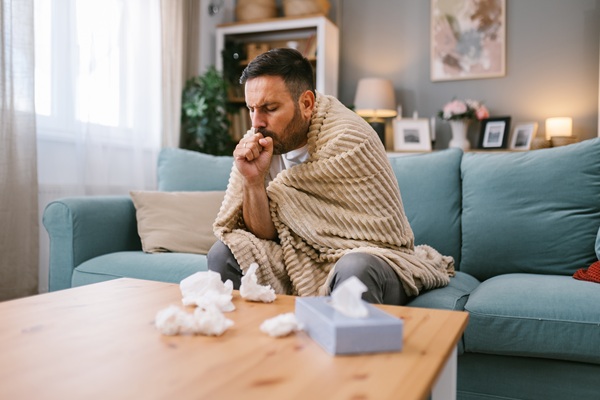Eye Injury Treatment North Las Vegas, NV
It is important to know how to receive proper treatment for different types of eye injuries. After an eye injury, there is often a large amount of pain. Receiving prompt care for the damaged eye is crucial to ensure no long-term complications develop as a result.
In some cases, more minor eye injuries are treatable at home with careful and proper care techniques. However, more serious eye injuries, such as loss of eyesight, severe pain, or bleeding, could result in complications and need medical attention, which we can provide effectively and efficiently at our urgent care facility.
Eye injury exams and treatment are available at Encompass Care in North Las Vegas and the surrounding area. Our staff can help you determine whether the injury is detrimental and needs a specialist or can be treated with us. Call us at (702) 514-4295 to get evaluated today.

Eye Injury Treatment
Eye injuries refer to any physical or chemical wound to the eye or eye socket. They can occur while simply walking down the street or in the comfort of your own home. While prevention is the best method for dealing with an eye injury, it is not always possible despite taking the necessary precautions.
An eye injury of any kind that becomes extremely painful or concerning should be given immediate medical care to prevent more serious complications from developing, such as chronic pain, reduced vision, or even blindness. A few of the most common eye injuries include corneal abrasion, foreign objects in the eye, swollen or black eye, and subconjunctival hemorrhages.
Facts from The American Academy of Ophthalmology (AAO)
- Nearly half of all eye injuries occur at home, not at work
- More than 40 percent of eye injuries every year are related to sports or recreational activity
- More than 78 percent of eye injuries could have been avoided by the use of protective eyewear
- Eyes can be damaged by sun exposure, as well as chemicals, dust or objects
- More than 2,000 eye injuries occur every day
- 60 percent of injured workers lacked appropriate eye protection at the time of the accident
- Eye injuries make up over 45 percent of all head injuries that lead to missed work days
- Men are far more likely to sustain an eye injury than women
“An eye injury can occur while simply walking down the street or in the comfort of your own home.”
Corneal Abrasion
A corneal abrasion is one of the most common eye injuries that refers to a scratched cornea, also known as a scratched eye. While it is certainly a serious eye injury, a medical professional on our team can help treat it quickly and effectively. Most corneal abrasions are caused by a finger, a small yet damaging particle, or a makeup brush. In most instances, a corneal abrasion is recognizable since it typically causes pain.
The treatment we provide for a corneal abrasion depends on its severity. If the abrasion is minor, then it can be treated with a protective eye drop solution and proper rest. The majority of minor corneal abrasions tend to heal within three or four days. However, more serious corneal abrasions require more extensive treatment procedures, such as protective eyewear, and may take up to several weeks to fully heal.
Although corneal abrasions are not always easy to prevent, there are certain precautions you can take. First, be sure to wear protective eyewear when in an environment that puts you at higher risk, such as a construction zone. Also, it is not uncommon for a corneal abrasion to result due to dry eyes. Therefore, be sure to keep your eyes lubricated and properly cared for.
“Most corneal abrasions are caused by a finger, a small yet damaging particle, or a makeup brush.”
Foreign Objects and Substances
A foreign object or substance in the eye is when a substance not produced by the body or a foreign object enters the eye. Foreign substances cause a significant amount of discomfort and can be incredibly difficult to remove. When a foreign substance enters the eye, it usually creates a feeling of intense pressure and causes excessive blinking.
A foreign substance can enter the eye anywhere and at any time if the eye is unprotected. It can result from something as simple as dust particles floating around. As with any eye injury, the best form of treatment is to prevent a foreign substance from entering the eyes. Although it can be difficult to control what enters the eyes, certain areas pose a greater risk, such as construction zones where there is a lot of dust and broken glass around. Wearing protective eyewear when cutting grass, working in a construction zone, or dealing with chemicals is important in preventing eye damage.
Depending on the size and material of the substance, medical assistance may be necessary to treat it properly. If the object that enters the eye causes a minor level of pain, it can be washed out at home, and there is no real need for medical assistance. However, if the object causes immediate, severe pain or lasts for more than an hour, we can professionally clean it out, as the object can cause long-term damage if not treated properly.
“Although it can be difficult to control what enters the eyes, certain areas pose a greater risk, such as construction zones where there is a lot of dust and broken glass around.”
Check out what others are saying about our services on Yelp: Eye Injury Treatment in North Las Vegas, NV
Swollen or Black Eye
A swollen or black eye is when blood and other fluids gather around the eye region, typically after suffering a blow to the eye. In most instances, this is a minor injury that heals within several days and does not lead to any long-term complications. However, more serious blows to the eye can cause significant damage and even blindness in the affected eye(s).
The main cause for a swollen or black eye is a sudden, unexpected blow to the eye, such as getting punched, hit by a moving object (i.e., a baseball), or falling and hitting the eye on a hard surface. However, one may experience a swollen eye as a result of surgical procedures, allergies, or skin infections, such as cellulitis. Along with excessive swelling, a black eye typically shows signs of discoloration and increased sensitivity.
After suffering a swollen or black eye and receiving treatment, certain home care techniques can help reduce the recovery time and keep the pain at a manageable level. Reduce the swelling (typically the main cause of discomfort) by icing the affected area several times a day, take anti-inflammatory medication, and rest the eyes and body as much as possible.
For minor swollen or black eyes, discoloration and swelling should gradually dissipate within a few days. However, a swollen eye that leads to vision loss or severe pain, or if the swelling does not start to go away after several days, needs to be medically treated. Otherwise, it may heal improperly and cause unnecessary long-term complications.
“A swollen or black eye is when blood and other fluids gather around the eye region, typically after suffering a blow to the eye.”
Questions Answered on This Page
Q. What are the most common eye injuries?
Q. What is a corneal abrasion and how is it treated?
Q. How do foreign objects or substances affect the eyes?
People Also Ask
Q. What are the symptoms of pink eye?
Q. How do you diagnose a migraine headache?
Q. What types of reactions can occur from bites and stings?
Q. When should a child be taken to urgent care?
Q. How do I keep my child calm before visiting the emergency room?
Subconjunctival Hemorrhages
A subconjunctival hemorrhage occurs when the blood vessels underneath the clear surface of the eye rupture, causing the blood to be trapped and unable to be absorbed. Although subconjunctival hemorrhage symptoms may seem quite concerning on the surface, it is a fairly minor injury. In most cases, there are no noticeable signs of a subconjunctival hemorrhage other than extremely bright redness, which typically lasts a week.
The cause of subconjunctival hemorrhages is not fully understood, which makes it extremely difficult to prevent. However, certain behavior patterns can increase its likelihood including straining, chronic coughing, and constant rubbing. It is important to keep the eye properly lubricated using eye drops designed to prevent dry eyes, redness, and irritation. The most effective way to prevent a subconjunctival hemorrhage is having a proper amount of rest each night, keeping the eyes lubricated, and taking constant breaks, especially when working on a digital device for long periods of time each day.
Questions to Ask Your Urgent Care Provider
- Will there be any long-term damage as a result of my eye injury?
- What should I expect in terms of pain during the recovery?
- What treatment options will be used to treat my eye injury?
- How long will the recovery process take?
- How can I manage the pain during the recovery?
- What further treatment will be required once I leave the urgent care center?
- What is the best way to handle an eye injury immediately after the injury occurs?
- Are my symptoms normal for the type of eye injury that I have suffered?
- Can I touch my eye after the injury, or does that make the situation worse?
- Should I put pressure on my eye or let it heal on its own?
- How should I clean the laceration to my eye?
- How can I prevent eye injuries from occurring in the future?
“A subconjunctival hemorrhage occurs when the blood vessels underneath the clear surface of the eye rupture, causing the blood to be trapped and unable to be absorbed.”
Frequently Asked Questions
Q. What are the most common types of eye injuries at home vs. at work?
A. The most common types of eye injuries that occur at home are typically due to a blow to the eye, such as being hit by a baseball or tripping on a staircase and hitting your eye. At work, eye injuries typically result from exposure to a chemical or substance, especially when working in a laboratory or an outdoor area. While preventing an eye injury at home can be tricky, you can help reduce the chance by making your home safer. At work, be sure to wear protective eyewear when in high-risk areas, such as a construction zone or laboratory.
Q. How do I wash my child's eyes after they have been exposed to a chemical?
A. Getting a chemical in the eye is one of the more serious eye injuries, and it requires prompt treatment to avoid any long-term effects. First, find the nearest water source — typically a sink — and thoroughly wash the eyes out for 15 minutes. As you rinse, hold the eye(s) open with your fingers to ensure the water is able to clean out the chemical. After washing the eye out thoroughly, visit us or an urgent care center near you to ensure you receive proper eye treatment and there are no long-term concerns to worry about.
Q. Who do I contact if my eye is bleeding?
A. If your eye is bleeding, it is important to seek medical assistance as soon as possible in order to receive proper treatment. With that said, the cause of the bleeding dictates how severe the injury is. If it is due to a blow to the eye but you can still see, then there is less cause for concern but should still be checked at an urgent care center. However, if you are unable to see after the blow to the eye or it occurs due to exposure to a chemical, the issue will likely require a 911 call.
Q. What are the most common causes of eye injuries?
A. Eye injuries can result from a blow to the eye (if a particle or chemical enters the eye) or a subconjunctival hemorrhage (which leads to severe redness and eye discomfort). Any symptoms suggesting an eye injury require immediate professional opinion and possible treatment at an urgent care center. With proper, prompt treatment, most minor eye injuries do not carry any long-term risks.
Q. My vision still has not returned since being treated for my eye injury. What do I do now?
A. Be sure to visit an optometrist if you believe to have lost your vision, regardless of whether you believe it is temporary or long term. While it is normal to have diminished vision for certain eye injuries, the complete loss of vision after an eye injury of any kind is not normal and suggests something may be wrong. In order to ease anxiety and understand the scope of the injury and if there is long-term vision loss, consult with an optometrist for best results.
Start Feeling Better – Visit Us Today
By visiting us as soon as possible, our team can help get you the professional treatment you need. Instead of waiting around and allowing the symptoms to get worse, we can provide you with stronger medication and treatment options instead of ineffective store-bought products.
Definitions
Consult With Us
Whether an injury is the result of a blow to the eye, a foreign substance in the eye, or a non-contact eye injury, we have the knowledge and resources available to provide professional medical care. If you are concerned about an eye injury and its severity, call us at 702-514-4295.
Helpful Related Links
- American Journal of Medicine. American Journal of Medicine. 2023
- American Medical Association (AMA). American Medical Association (AMA). 2023
- American Medical Society For Sports Medicine (AMSSM). American Medical Society For Sports Medicine. 2023
- American Trauma Society. American Trauma Society. 2023
- John Hopkins Medicine Orthopaedic Surgery. John Hopkins Medicine Orthopaedic Surgery. 2023
- National Council on Aging. National Council on Aging. 2023
- Orthopaedic Surgery: Association of American Medical Colleges. Orthopaedic Surgery: Association of American Medical Colleges. 2023
- Radiological Society of North America. Radiological Society of North America. 2023
About our business, license, and website security
- Encompass Care was established in 1997.
- We accept the following payment methods: American Express, Cash, Discover, MasterCard, and Visa
- We serve patients from the following counties: Clark County
- We serve patients from the following cities: Las Vegas, North Las Vegas, Henderson, Paradise, Spring Valley, Boulder City, and Winchester
- Norton Safe Web. View Details
- Trend Micro Site Safety Center. View Details
Back to top of Eye Injury Treatment
